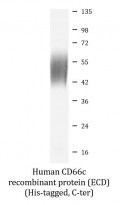ARG70297
Human CD66c recombinant protein (ECD) (His-tagged, C-ter)
Human CD66c recombinant protein (ECD) (His-tagged, C-ter) for Binding Activity,SDS-PAGE and Human
Overview
| Product Description | HEK293 expressed, His-tagged (C-ter) Human CD66c recombinant protein (ECD). |
|---|---|
| Tested Reactivity | Hu |
| Tested Application | Binding, SDS-PAGE |
| Target Name | CD66c (ECD) |
| Species | Human |
| A.A. Sequence | Lys35 - Gly320 of Human CD66c (NP_002474.3) with 6X His tag at the C-terminus. |
| Expression System | HEK293 |
| Alternate Names | Normal cross-reacting antigen; Carcinoembryonic antigen-related cell adhesion molecule 6; CEAL; CD66c; CD antigen CD66c; NCA; Non-specific crossreacting antigen |
Application Instructions
| Application Note | Binding activity test: Measured by its binding ability in a functional ELISA. Immobilized Recombinant Human CEACAM6 at 2 µg/ml (100µl/well) can bind Recombinant Human CEACAM8 with a linear range of 0.1-0.4 µg/ml. |
|---|
Properties
| Form | Powder |
|---|---|
| Purification Note | 0.22 µm filter sterilized. Endotoxin level is <0.1 EU/µg of the protein, as determined by the LAL test. |
| Purity | >95% (by SDS-PAGE) |
| Buffer | PBS (pH 7.4) |
| Reconstitution | Reconstitute to a concentration of 0.1 - 0.5 mg/ml in sterile distilled water. |
| Storage Instruction | For long term, lyophilized protein should be stored at -20°C or -80°C. After reconstitution, aliquot and store at -20°C for up to one month, at 2-8°C for up to one week. Storage in frost free freezers is not recommended. Avoid repeated freeze/thaw cycles. Suggest spin the vial prior to opening. |
| Note | For laboratory research only, not for drug, diagnostic or other use. |
Bioinformation
| Gene Symbol | CEACAM6 |
|---|---|
| Gene Full Name | carcinoembryonic antigen-related cell adhesion molecule 6 (non-specific cross reacting antigen) |
| Background | This gene encodes a protein that belongs to the carcinoembryonic antigen (CEA) family whose members are glycosyl phosphatidyl inositol (GPI) anchored cell surface glycoproteins. Members of this family play a role in cell adhesion and are widely used as tumor markers in serum immunoassay determinations of carcinoma. This gene affects the sensitivity of tumor cells to adenovirus infection. The protein encoded by this gene acts as a receptor for adherent-invasive E. coli adhesion to the surface of ileal epithelial cells in patients with Crohn's disease. This gene is clustered with genes and pseudogenes of the cell adhesion molecules subgroup of the CEA family on chromosome 19. [provided by RefSeq, Apr 2014] |
| Function | Cell surface glycoprotein that plays a role in cell adhesion and tumor progression (PubMed:2803308, PubMed:2022629, PubMed:1378450, PubMed:8776764, PubMed:11590190, PubMed:10910050, PubMed:14724575, PubMed:16204051). Intercellular adhesion occurs in a calcium- and fibronectin-independent manner (PubMed:2022629, PubMed:16204051). Mediates homophilic and heterophilic cell adhesion with other carcinoembryonic antigen-related cell adhesion molecules, such as CEACAM5 and CEACAM8 (PubMed:2803308, PubMed:2022629, PubMed:8776764, PubMed:11590190, PubMed:16204051). Heterophilic interaction with CEACAM8 occurs in activated neutrophils (PubMed:8776764). Plays a role in neutrophil adhesion to cytokine-activated endothelial cells (PubMed:1378450). Plays a role as an oncogene by promoting tumor progression; positively regulates cell migration, cell adhesion to endothelial cells and cell invasion (PubMed:16204051). Also involved in the metastatic cascade process by inducing gain resistance to anoikis of pancreatic adenocarcinoma and colorectal carcinoma cells (PubMed:10910050, PubMed:14724575). [UniProt] |
| Cellular Localization | Cell membrane; Lipid-anchor, GPI-anchor. [UniProt] |
| Calculated MW | 37 kDa |
Images (1) Click the Picture to Zoom In






